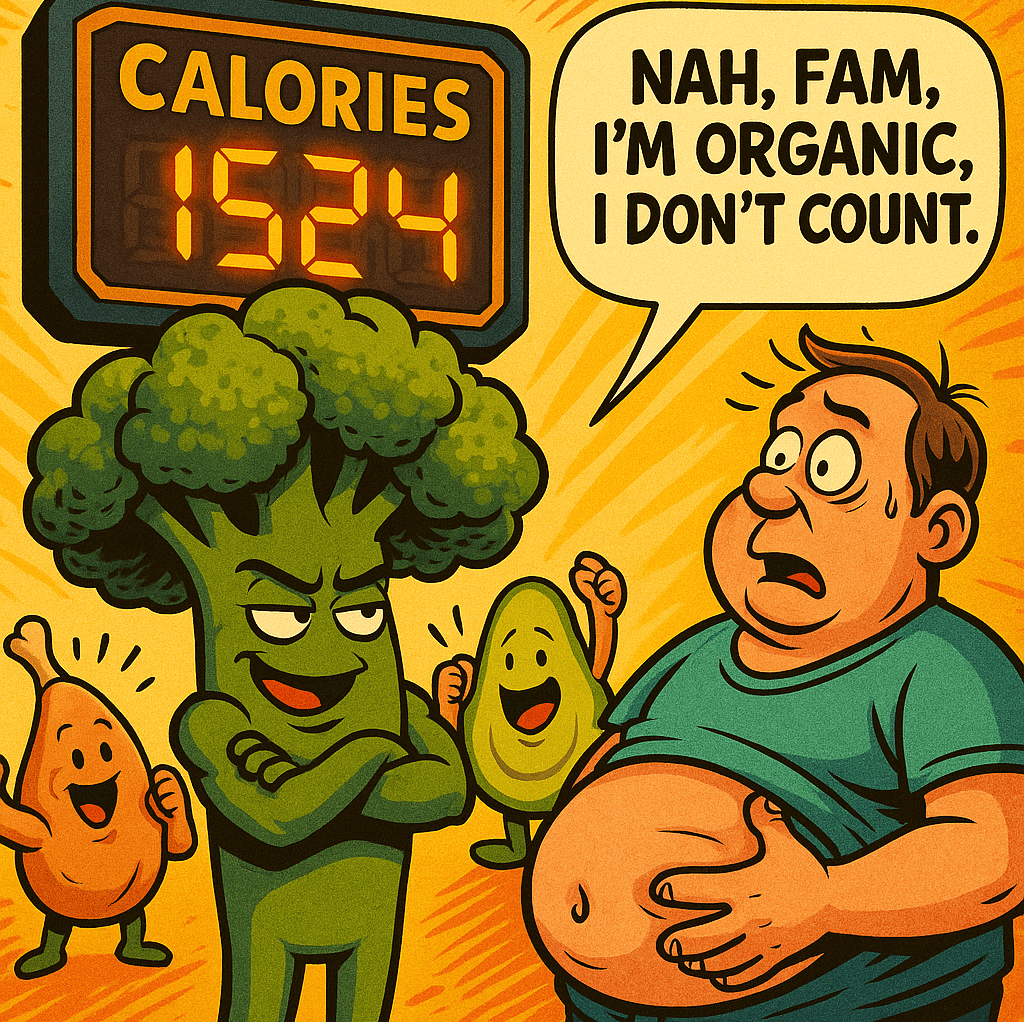Nutrition Myth #1: Calories Don’t Matter if You Eat Clean
Bust the popular myth that “clean eating” cancels calories. Learn why energy balance still rules, how minimally processed foods help, and what the real takeaway is for health and weight loss.
NUTRITION
Adi English
8/31/20253 min read


🍎 Nutrition Myth #1: “Calories Don’t Matter if You Eat Clean”
📖 Article (~310 words)
So let me get this straight: you think eating “clean” means you’ve got immunity to physics? Like, broccoli is gonna show up, look at your belly, and say: “Nah, fam, I’m organic, I don’t count.” Come on. If calories didn’t matter, I’d be pounding almond butter by the jar and still rocking abs. Spoiler: that’s not what happens.
Here’s the truth: energy balance always matters. Your body doesn’t check a moral label on food. It just sees energy coming in (calories) and energy going out (movement, metabolism, survival). Eat more than you burn = weight gain. Eat less = weight loss.
Now, minimally processed foods — whole, natural stuff like veggies, fruits, oats, chicken — they help because:
They’re harder to overeat (fiber, water, protein = more fullness).
They pack micronutrients that improve health.
They support better recovery after exercise.
But you can still eat too much. Six tablespoons of peanut butter, an “innocent” avocado toast with triple cheese, a couple of protein bars — congrats, you just ate 1,200 calories before lunch. Your health markers don’t care if the food is “clean” if you’re still eating more than you need.
So does that mean eating clean is pointless? No. It means eating clean is step one, not the whole game. Think of it like buying a treadmill — cool, but if you never step on it, it’s just a clothing rack. Clean food sets you up for success, but the scoreboard is always calories in vs. calories out.
Takeaway: Eating clean = great. Calories = still the boss. You can gain weight on chicken and rice just like on donuts — it just takes longer because rice won’t seduce you at 2 a.m. like Krispy Kreme.
🗂 Vocabulary
Energy balance – the relationship between calories you eat and calories you burn.
Simple: If you eat more than you burn, you gain weight.
Example: Keeping a good energy balance helps you stay fit.
Student example: ____________
Minimally processed – foods that are close to their natural state.
Simple: Fruits, veggies, oats, chicken.
Example: Minimally processed foods usually have more nutrients.
Student example: ____________
Micronutrients – vitamins and minerals your body needs in small amounts.
Simple: Iron, vitamin C, calcium.
Example: Vegetables provide important micronutrients.
Student example: ____________
Overeat – to eat more food than your body needs.
Simple: Eating too much.
Example: He tends to overeat when stressed.
Student example: ____________
Recovery – how your body heals and gets stronger after stress or exercise.
Simple: Rest and food help muscles recover.
Example: Sleep is just as important as training for recovery.
Student example: ____________
Markers (health markers) – signs or measurements that show your health.
Simple: Blood pressure, cholesterol, blood sugar.
Example: Eating well can improve your health markers.
Student example: ____________
Fullness – the feeling of not being hungry after eating.
Simple: When you feel satisfied.
Example: High-fiber food gives a longer feeling of fullness.
Student example: ____________
Set you up – (phrasal verb) to prepare you for success.
Simple: To make things easier for you.
Example: A good breakfast sets you up for the day.
Student example: ____________
Scoreboard – the thing that shows the final result.
Simple: What really counts in the end.
Example: Calories are the scoreboard for fat loss.
Student example: ____________
Takeaway – the main point to remember.
Simple: The most important lesson.
Example: The takeaway from the lecture was that habits matter more than motivation.
Student example: ____________
📝 Exercises
Comprehension
What does “energy balance” mean?
Why do minimally processed foods help with health?
Can you gain weight by eating only “clean” food?
What is one reason people feel full after eating clean foods?
What is the main takeaway from this article?
Multiple Choice
What is the main cause of fat gain?
a) Carbs b) Overeating c) Clean food d) Protein
Which of these is a micronutrient?
a) Fiber b) Vitamin C c) Calories d) Sugar
What helps you feel full?
a) Fiber and protein b) Eating late at night c) Drinking soda d) Skipping meals
Which food could make you overeat if you don’t track portions?
a) Broccoli b) Peanut butter c) Lettuce d) Watermelon
What does “takeaway” mean?
a) A fast-food meal b) The most important lesson c) A food delivery app d) Calories in a meal
Fill in the Blank
Eating more than your body needs means you _______.
Fruits and vegetables are often called _______ processed foods.
Vitamins and minerals are examples of _______.
A good night’s sleep helps with _______ after training.
The main _______ from this article is that calories always count.
True/False
You can eat unlimited amounts of clean food without gaining weight. (False)
Micronutrients are important for health. (True)
Peanut butter is low in calories, so it cannot cause weight gain. (False)
Calories are the scoreboard of fat loss or gain. (True)
Eating clean foods guarantees weight loss. (False)
Discussion
Do you think people use “eating clean” as an excuse to overeat?
What foods make you feel the most full?
Do you track your calories, or just try to eat healthy?
How can someone balance eating “clean” with enjoying treats?
What is your personal takeaway from this article?
